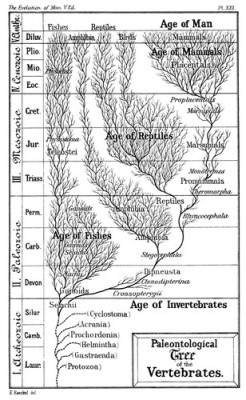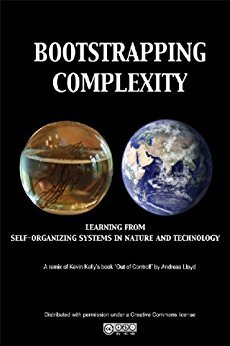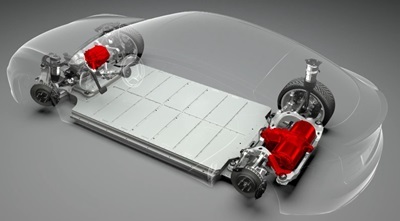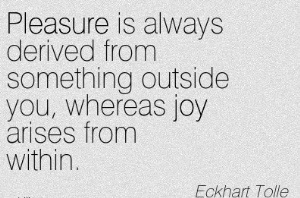Jeremie Averous's Blog, page 64
January 11, 2018
How Urgent It Is to Ban Autonomous AI Driven Weapons
The campaign to ban autonomous bots that act in swarms and have the ability to decide to kill a human on http://autonomousweapons.org has produced an amazing video that is worth watching.
 The question of AI applied to daily objects is put in concrete terms in this simulation, not just as an intellectual discussion. In the video a parallel is made with nuclear deterrence and proliferation control approaches, which is quite worth pondering.
The question of AI applied to daily objects is put in concrete terms in this simulation, not just as an intellectual discussion. In the video a parallel is made with nuclear deterrence and proliferation control approaches, which is quite worth pondering.
Like all technologies AI will bring a huge number of benefits and also its downside. Will humankind be wise enough?
(if you can’t see the video the Youtube link is https://www.youtube.com/watch?v=9CO6M2HsoIA)

January 9, 2018
How Good Visionary Decisions Are In Fact Reflections of Social Mindset Changes
When automated roadside speed cameras were introduced in France a few years ago, the behavior of drivers with regards to speed was substantially changed and the statistics of rod casualties dropped significantly. This introduction did generate some reactions, but overall it was accepted by the population that was fed up with the dangers of automobile driving – there were no massive demonstrations as it sometimes happen in the country.
 The key question here is whether the introduction of speed cameras was the trigger of the change (and a visionary act by a leader), or whether it was rather the concrete result of a change of viewpoint by society.
The key question here is whether the introduction of speed cameras was the trigger of the change (and a visionary act by a leader), or whether it was rather the concrete result of a change of viewpoint by society.
Today with some hindsight the view is rather the latter: this change was probably more the result of a change of mindset (contrary to what the leader in question – who went on to be President of France- would like us to believe!). It might have taken some courage to transform this change of mindset into an actual concrete change, but that was not the source of the transformation.
It is astonishing to find out that many of the key policy changes in organizations or in society are rather the courageous formalization of an already evolving mindset rather than the visionary decision of a single leader – contrary to what the lore tries to make us believe. Actually purely visionary decisions without a background of mindset change is highly suspicious. Good decisions are the formalization of a pre-existing condition.

January 6, 2018
How Nature Can Give Us Directions About the Evolution of the Net
A major theme of the book ‘Bootstrapping Complexity‘ by Kevin Kelly is that we should learn from nature’s evolutionary mechanism when trying to understand the dynamics of the modern complexity of the net.
 “Nature does this every day: Bootstrapping systems that interact with themselves and produce themselves from themselves. How do you make something from nothing ? Although nature knows this trick, we haven’t learned much just by watching her”
“Nature does this every day: Bootstrapping systems that interact with themselves and produce themselves from themselves. How do you make something from nothing ? Although nature knows this trick, we haven’t learned much just by watching her”
“The new cyberneticians are extracting the logical principle of both life and machines , and applying each to the task of building extremely complex systems , thus conjuring up contraptions that are at once both made and alive. In these efforts to create complex mechanical things , again and again they return to nature for directions. They have learned more by their failures in creating complexity and by combining these lessons with small successes in imitating and understanding natural systems than the original cybernetic group could have hoped for. And in doing so , they are fulfilling the notion first presented in the Whole Earth Catalog , itself inspired by the original cybernetics group : “We are as gods and might as well get good at it“”
Thus nature, a self-evolving system that creates more and more complexity as it evolves, should maybe be studied a bit closer when it comes to understanding how our current setup evolves increasingly towards more complexity, for example with the emergence of Artificial Intelligence from dumber machines and networks.

January 4, 2018
How Original Books Get Remixed with Success By Followers
When I opened the e-book ‘Bootstrapping Complexity‘ by famous Kevin Kelly, I realized that this was actually a remix of a previous book by the author performed by an admiring follower, Andreas Lloyd.
 This remix was initiated by the wish of Andreas Lloyd to make some aspects clearer and to focus the book on complexity.
This remix was initiated by the wish of Andreas Lloyd to make some aspects clearer and to focus the book on complexity.
What’s great in this example is the initial author’s reaction: “Soon after putting this remix online , I sent a note with a link to Kevin Kelly to make him aware of the remix , hoping that he would approve. He did approve. Much more than I expected. And it didn’t take him long to reply : I LOVE the remix ! I wish you had been my editor . There is only one thing missing from this fantastic remix – a better title . I was never happen with the book’s title and now that it is more focused , the need is even greater.”
In the Collaborative Age, more and more original works will be remixed and made into numerous publications to address specific needs. A great example of ‘mutual learning’ leadership!

January 2, 2018
How The Fourth Revolutions Leads to Re-Engineering Familiar Objects between Software and Hardware
In this interesting article ‘BMW and Audi Want to Separate Vehicle Hardware from Software‘ we can see that the automotive industry is taking a clear direction: re-engineering the view of the automobile as a system and changing basic assumptions. What Tesla is doing in terms of changing their car behavior by simple software updates is but the start of a revolution.
 In a wider sense, the software and network capabilities of the Fourth Revolution will certainly lead us to re-engineer fully a large number of familiar hardware systems. This will create new hazards of course (like hacking) and also a large number of new possibilities that we can’t even envisage today. Changing the performance of what we considered to be fixed capabilities will modify significantly our perception of these familiar items.
In a wider sense, the software and network capabilities of the Fourth Revolution will certainly lead us to re-engineer fully a large number of familiar hardware systems. This will create new hazards of course (like hacking) and also a large number of new possibilities that we can’t even envisage today. Changing the performance of what we considered to be fixed capabilities will modify significantly our perception of these familiar items.
In any case it will be a revolution for all of us involved in the design and engineering of these systems, and it just starts now, when we know that most of these items have a lifespan of decades. I can’t wait to see the changes unrolling.

December 30, 2017
How Not To Confuse Pleasure and Happiness
In this great post ‘The pleasure/happiness gap‘ Seth Godin reminds us that those are very different. And they are also distinct from the physiological point of view: “Pleasure is short-term, addictive and selfish. It’s taken, not given. It works on dopamine. Happiness is long-term, additive and generous. It’s giving, not taking. It works on serotonin.”
 “Pleasure and happiness feel like they are substitutes for each other, different ways of getting the same thing. But they’re not.” Actually they are quite the opposite of one-another.
“Pleasure and happiness feel like they are substitutes for each other, different ways of getting the same thing. But they’re not.” Actually they are quite the opposite of one-another.
What people sell to us, what society tries to impose on us is pleasure.
Happiness develops internally and is a voluntary construct. It takes time and personal effort, and it is so much worth it.
It is good to be reminded from time to time how those two can be so opposite.

December 28, 2017
How We Interact With Androids and What It Teaches Us
I was fascinated by this piece on Wired about our the research on our interactions and emotions with Androids: ‘Love in the Time of Robots‘. It revolves around the research by Hiroshi Ishiguro, a Japanese professor that uses beautiful replicas to research the human-to-robots interaction.
 It is easy to emphasize with a robot: “As complex as we assume ourselves to be, our bonds with one another are often built on very little. Given all the time we now spend living through technology, not many of us would notice, at least at first, if the friend we were messaging were replaced by a bot. And humans do not require much to stir up feelings of empathy with another person or creature—even an object. In 2011 a University of Calgary test found that subjects were quick to assign emotions and intentions to a piece of balsa wood operated with a joystick. In other words, we are so hardwired for empathy that our brains are willing to make the leap to humanizing a piece of wood. It’s a level of animal instinct that’s slapstick-hilarious and a degree of vulnerability that’s terrifying.”
It is easy to emphasize with a robot: “As complex as we assume ourselves to be, our bonds with one another are often built on very little. Given all the time we now spend living through technology, not many of us would notice, at least at first, if the friend we were messaging were replaced by a bot. And humans do not require much to stir up feelings of empathy with another person or creature—even an object. In 2011 a University of Calgary test found that subjects were quick to assign emotions and intentions to a piece of balsa wood operated with a joystick. In other words, we are so hardwired for empathy that our brains are willing to make the leap to humanizing a piece of wood. It’s a level of animal instinct that’s slapstick-hilarious and a degree of vulnerability that’s terrifying.”
More importantly this research asks difficult questions about what makes us enter in a relationship and express our emotions. Are our feelings an illusion? Is a conversation an illusion of understanding what the other person thinks? What makes us believe we are interacting with another human? Would we be satisfied with an interaction with a robot? Fascinating questions for a not-to-far future…

December 26, 2017
How to Best Engage and Transform People
Seth Godin, in his piece about how to transform higher education, writes a quote that is deeply at the core of change management in general: “If you want people to become passionate, engaged in a field, transformed by an experience?—?you don’t test them, you don’t lecture them and you don’t force them. Instead, you create an environment where willing, caring individuals can find an experience that changes them“.
 This is a fundamental recipe of change management: get people to find their own way within a general direction. It is clearly the only way to get people to get passionate. This means that they will go through a learning experience, and thus commit mistakes and explore dead-ends. This will be more messy and might take slightly more time. We need to be patient and benevolent during the process. Still that is absolutely the best solution for a sustainable and true change.
This is a fundamental recipe of change management: get people to find their own way within a general direction. It is clearly the only way to get people to get passionate. This means that they will go through a learning experience, and thus commit mistakes and explore dead-ends. This will be more messy and might take slightly more time. We need to be patient and benevolent during the process. Still that is absolutely the best solution for a sustainable and true change.
Never underestimate the power of passion and willingness. It just needs the space to grow and the time to flourish. Let that space and that time be.

December 23, 2017
How to Re-Engineer Higher Education
This column by Seth Godin in Medium is worth reading: ‘“Will this be on the test?” Rethinking online education“. Seth Godin is an acclaimed marketing guru who we have often quoted in this blog. He is also a founder of what he calls an alternative MBA or altMBA. His educational approaches in this program are widely different from conventional higher education, and he explains why there are dramatically more effective – and why MooCs are not so successful.
 Industrial-Age Higher Education: the student factory
Industrial-Age Higher Education: the student factoryTraditional higher education is defined by institutions: “large universities that have built their institutions around lectures, tests and accreditation. So have many internal training functions.” This is why the main question is not whether one learns useful things, but whether it will be on the test as the only objective is to pass.
Online learning developed by universities is just a transfer into the online space of universities’ basic assumptions, which don’t really work. This explains why after an initial fervor for MooC, we find out now that most participants lack engagement and 99% of students don’t finish the courses.
Seth Godin’s proposal, executed in his acclaimed altMBA program is: “At its core: enrollment, not tests. Experiences not media consumption. Peer to peer, not top down“. This has been the foundation for a very successful program for executives. Those principles could be used for the re-foundation of higher education in the Collaborative Age.

December 21, 2017
How We Need to Define Urgently Personal Behavior Rules Around Smartphones
The provoking title of this Atlantic piece ‘Have Smartphones Destroyed a Generation?‘ is worth pondering. And the article worth reading too. The theme of the article is “more comfortable online than out partying, post-Millennials are safer, physically, than adolescents have ever been. But they’re on the brink of a mental-health crisis.”
 Modern group social discussion?
Modern group social discussion?The author is a mental health researcher that has noticed an abrupt change in teenager generational behavior around 2012 – the year 50% of the developed country population got a smartphone i.e. where smartphone penetration began to change our habits. “The arrival of the smartphone has radically changed every aspect of teenagers’ lives, from the nature of their social interactions to their mental health. These changes have affected young people in every corner of the nation and in every type of household.”
Teenagers socialize physically less and the rate of depression and suicide is going up dramatically. Research shows that more time on the screen and on social networks lead to higher rates of depression and lower happiness.
Like all new tools in our lives, we need to define social rules to live with it. The smartphone and the associated social networks are still too new to have developed and ingrained these behavioral rules. It might become a matter of urgency, still I am optimistic that a reaction will prevail.




